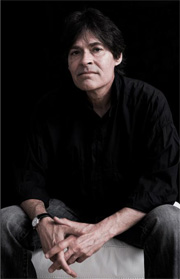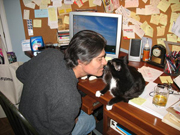Jack Ketchum
(Photos © Jack Ketchum/Caudio Sforza)

Stephen King once called author Dallas Mayr - better known under the nom de plume Jack Ketchum - the scariest guy in America. In his interview with EVOLVER, however, he turned out to be a pretty likeable person ... 27.08.2008
On fame.
EVOLVER: Your popularity in the US has been pretty high for many years - in Europe, however, particularly in the non-English speaking countries, people are just starting to know your name. For instance: The first translation of any of your books was "The Girl Next Door" two years ago. Do you think Europe wasn’t ready for you up till now? Is it a matter of mentality?
Ketchum: I think it's a combination of things. Copies sold over here, for one. If my agent can say to her European sub-agents that this book sold 100,000 copies in the U.S. last year, it's a whole lot more attractive and motivating than saying it only sold 40,000. Then there are the movies, "The Lost" and "The Girl Next Door" available on DVD, and "Red", soon to be released. They tend to promote the books both here and abroad. Finally, there's Stephen King. When he calls me "probably the scariest guy in the country" in "Entertainment Weekly", people tend to listen.
On becoming a writer.
 EVOLVER: You held down a lot of very different jobs (including being an actor) before you became "the Jack Ketchum". At which point did you decide to say: "Okay, from now on I’m gonna live off being a writer first and foremost!"
EVOLVER: You held down a lot of very different jobs (including being an actor) before you became "the Jack Ketchum". At which point did you decide to say: "Okay, from now on I’m gonna live off being a writer first and foremost!"
Ketchum: I have a small book of memoirs just out from Bloodletting Press called "Book of Souls". The first piece in it is called "Henry Miller and the Push", which details exactly that moment. In short, I was walking home in the pouring rain from my job as an author's agent one day - by then hating the damn job - with not a taxi in sight. When finally one did show up I ran for it. So did a little old lady. And I pushed her out of the way! I said to myself, what kind of monster am I becoming? Who the hell am I? Fuck it! I'm going to quit and start writing again. And then I met Henry Miller - who was a client of mine - in person. And that meeting gave me the courage to really give it my best shot.
EVOLVER: And why do you write, aside from the financial aspects?
Ketchum: The money's only a kind of validation that my work is worth reading. I guess I write because I never quite grew up - because it's a kind of play. High-level play. Because, masturbation aside, it's the most fun you can have all by yourself.
On horror fiction.
EVOLVER: Did you always want to write horror fiction - even at the very beginning? Or did you ever consider any other options? Which role did your early mentor, Robert Bloch (of "Psycho" fame), play in your choice?
Ketchum: I always liked horror fiction but I didn't set out to write it until I was almost thirty-five. In fact I wrote almost anything but that. I wrote poetry, plays, realistic short stories, a children's book, and a novel that wanted to have been written by Henry Miller, not me. Then when I started publishing I was writing mostly for rock'n' roll and men's magazines. It was only when I got the idea for "Off Season" that I started writing horror. Bob Bloch read all this stuff I mentioned from the time I was a kid straight through my adulthood, and always commented wisely on it.
On normality.
EVOLVER: You tend to prefer stories without any supernatural subtext (except maybe "She Wakes" or the story with the dying cat and the ghost: "Returns") - do you dislike supernatural horror? Or is real life horrible enough for you? In your stories "Right to Life" or "The Girl Next Door", to name some, the horror doesn’t stem from any kind of - even human - monster but from the proverbial "average Joe". You seem to depise "normality" almost categorically. What’s normal - to you?
Ketchum: I don't dislike supernatural horror at all. I read a good bit of it. And as you say, "She Wakes" and a number of my short stories have a supernatural aspect to them. But what really scares me most is what we do to one another, what people are capable of. So that's what I tend to write. I don't despise normality so much as I don't immediately trust it. A "normal" exterior can mask a lot of vile behavior. Hell, we hear about it practically every week.
On violence.
EVOLVER: The "Village Voice" once dismissed your work as "violent pornography". Probably not the worst type of publicity! In any case, do you personally believe that people may tend to become more violent when they read violent horror fiction (or watch movies like "Hostel" or "Saw" or play certain computer games) under specific circumstances?
Ketchum: It seems to me that violent people are violent people. They may act out a scenario they've read about or seen in the movies or they may invent their own. But either way, they're going to be violent. And I think that fiction readers in general - not just horror readers, but them included - tend to be somewhat gentler, more empathic people. After all, part of the reason you read fiction in the first place is to experience empathy.
EVOLVER: How do you feel about the "torture porn" boom in contemporary (mainstream) horror, such as the movies mentioned before?
Ketchum: I think that first of all, it's a misnomer. You want to see real torture porn, go onto the net. There's stuff on there that'll curl your hair, and it's real. These are just very extreme horror movies, some better than others. Not much different from the slasher movies of the seventies. Some of those were pretty nasty too, remember?
On the "Summer Of Love"
 EVOLVER: You like to refer to yourself as having been a flower child during your youth. How does one move from the era of “love & peace” to the (fictional) violence of "Off Season" or "The Girl Next Door"? How did you experience the "psychedelic" Sixties (and manage to survive)? And what defines the 60s better: Woodstock or Altamont?
EVOLVER: You like to refer to yourself as having been a flower child during your youth. How does one move from the era of “love & peace” to the (fictional) violence of "Off Season" or "The Girl Next Door"? How did you experience the "psychedelic" Sixties (and manage to survive)? And what defines the 60s better: Woodstock or Altamont?
Ketchum: There was only one Altamont but dozens of Woodstocks. I think the real flower children, and there were many of them - not the ones who dressed hippie or talked hippie but the real deal - are all a bunch of failed idealists. I know I am. We're all of us terribly disappointed. Me? I had a short glimpse of something really beautiful among us humans - and then just like that it was gone. But a short glimpse is better than none at all. Personally, I think it showed me about some hard contrasts. What we wish for and what is. What we might attain and what little we actually do attain. The sixties fueled my anger but at the same time they softened my heart. The anger and the heart are both in my work, I think: the failed idealist, still hoping to make a little dent at least.
On inspiration.
EVOLVER: You said once that people were your main inspiration for your stories ...
Ketchum: True.
EVOLVER: Are there any personal role models for you in literature?
Ketchum: Too many to name. But the list includes authors as diverse as Robert Bloch and Ray Bradbury, Henry Miller, Raymond Chandler and James M. Cain, Faulkner, Hemingway, Jim Thompson, Elmore Leonard, J. P. Donleavy, the late Victorians like Hardy and Fielding, Camus, Emil Zola - I could go on all day ...
EVOLVER: Any movies which had (or still have) an impact on your writing?
Ketchum: Way too many to name. I steal ideas from movies all the time.
EVOLVER: Any music you really like, not just as inspiration but as a special part of your life? Elvis is mentioned frequently if I'm correct ...
Ketchum: Elvis, yes. He was my very first hero as a kid. But the blues has always been a great source of pleasure and inspiration to me.
On cats.
EVOLVER: Cats often play a major role in your books. Why?
Ketchum: I have four of them. Hell, I've had cats my whole adult life. I don't think I understand them exactly - in fact I've often said I'd give a year of my life for a single day inside a cat's head - but I like the way they understand me. And I don't think a more beautiful or calming creature walks the earth. Why not celebrate them in my stuff?
 EVOLVER: Considering you are such a cat lover: Why did you choose a dog for "Red"?
EVOLVER: Considering you are such a cat lover: Why did you choose a dog for "Red"?
Ketchum: I grew up with dogs and I'm an animal-lover in general. But "Red" came about because of a conversation I had with my local bartender, who knows how I feel about animals. He asked if I'd seen an item on CNN about this old man who was out fishing with his dog one day, when these kids came by asking him for money, and because he didn't have any, shot his old dog out of pure spite. He'd tried the justice system but the system wasn't interested, so here he was on TV. Well, I never did catch the item or find out what happened to that old man but the whole thing just pissed me off.
And I sometimes write best when I'm pissed off. Also there was a real Red who, just like Sam Berry's dog in the book, led my well-loved uncle to safety when he'd blown his foot off in a hunting accident. I'd wanted to write about that for a long time, and finally got the chance.
On movies.
EVOLVER: You write in a very "cinematic" way - the dialogue, the way you utilize suspense. How many of your books have been turned into movies so far? And are you satisfied with the way they've been done?
Ketchum: Three books have been turned into movies - "The Lost", "The Girl Next Door" and "Red". I've been very lucky in that in each case the screenwriter or the screenwriters have paid a lot of attention to the source material, really trying to get it right and do justice to my book. They're three very different movies in terms of stylistic approach and content but what they have in common is an energy and a seriousness of intent that's really very gratifying.
On politics
EVOLVER: In interviews you often mention the US right-wing movement, including of course the Republicans (and, above all, the lovely President Bush) - frequently in a quite scathing way. Are you - somehow - politically active?
Ketchum: Boy, am I ever the wrong person to ask this question! I'm about as politically active as my cats - except my cats don't despise politicians as far as I know. I do think the right wing - worldwide - are a bunch of schoolyard bullies. And when I was in school they usually wound up in detention.
On smoking, drinking and the rest.
EVOLVER: It’s getting increasingly uncomfortable every year. Sooner or later, smoking will probably carry the death penalty, and drinking seems to be the not too far behind; the type of literature that gets praised by 99 percent of the critics is becoming more and more anemic. You seem to live, thank God, not according to the laws of the New World Order. But still, the new “harmlessness” is spreading like a virus. Why is that, in your opinion?
Ketchum: I've never been interested in being politically or socially correct. That's not to say I frequently vomit into someone's lap at parties. It just seems silly to me to abide by any more rules than those you absolutely need in order to get by. I think we've become more and more neurotic in the years since I was in my twenties and thirties. We're afraid of everything. We want to restrict everything and manage it. Well, life isn't terribly manageable. The frequency of natural disasters ought to be enough to tell us that. But somehow we don't get it. When I was a kid the idea of putting on a helmet to ride a bike would have gotten you laughed out of the neighborhood - and rightly so. And I don't remember anybody wearing one against all those riot-sticks during the Vietnam protests either. It would be nice to live long enough to see the world get some guts again - but I don't think it's going to happen, sorry to say.
 On Europe.
On Europe.
EVOLVER: You mentioned once that you like old places and old buildings. Ever thought about moving to "old" Europe?
Ketchum: Greece. If I ever do get filthy rich, which is highly unlikely at this point, I'd keep my apartment here and buy a home there. I think Greece is haunted in the best possible way. Like the Summer of Flowers, something happened there for a very brief time, very long ago, that was utterly special, a kind of celebration. And it lingers.
On whatever you want.
EVOLVER: If there's something you want to tell us - please do so!
Ketchum: I'll leave you with the words of Louis de Bernieres in "Birds Without Wings": "Take your time," he would say to himself, "if the cat's in a hurry she has peculiar kittens."
Jack Ketchum
(Photos © Jack Ketchum/Caudio Sforza)

EVOLVER Reloaded
About EVOLVER - The International BETA Edition
"EVOLVER - Play it again, HAL"
The Austrian web-based magazine EVOLVER is the first (and still the best) online publication by professional journalists and writers in the German speaking countries. For more than eleven years now (since autumn of 1996), the EVOLVER editors provide their readers with exclusive stories, specials, reviews and opinion columns from all areas of pop-, cyber- and subculture - from Hunter S. Thompson to "Bastard Pop", from Nick Tosches to Frank Miller, from original trash novels to a comprehensive history of porn movies.
While the Austrian Film Museum is vacationing in sunny Italy, the Filmarchiv Austria is offering a shady alternative: a journey into a dark Vienna, home of spies, killers, disreputable barmaids, psychotic perverts, Nazi loyalists and taxi drivers with no passports. Thomas Fröhlich travels in time from the year 1949 to 1974 and encounters some seedy characters.
The pressure to succeed was enormous, as were the expectations: Zack Snyder dared try his hand on comic fandom's holy grail - and his attempt manages to capture the complexity and atmosphere of the original in moving pictures.
In "Tropic Thunder", director Ben Stiller sends three wimpy Hollywood actors to vietnam. EVOLVER tells you which memorable genre characters we'd most likely take along on patrol - and which ones would stay home. Lock and load!
The first one managed to become Austria's most successful film of 2006. Now the sequel sees slasher heroine Nina venture into the Tyrolean snowdrifts. Unfortunately, that leaves us viewers somewhat frosty.
Andreas Prochaska's "Dead in 3 Days" was not only a good horror movie, but also the most successful Austrian film of 2006. Recently, the sequel was released ... EVOLVER met leading lady Sabrina Reiter and spoke to her about this installment, her beginnings as an actress and her favourite horror movies.
A new series of paperback originals called "Tomes of the Dead" combines flesh-eating zombie fun with other genres - such as historical novels, British gangster melodrama and hardboiled private eye adventures ... Let´s start watching the zombie detective!
Kommentare_